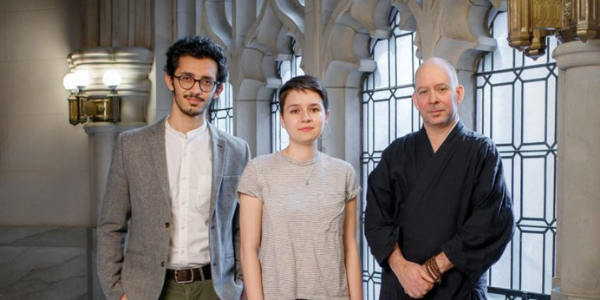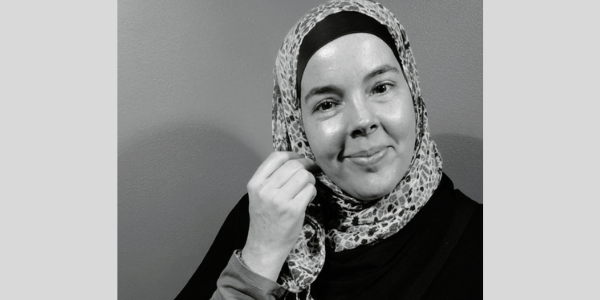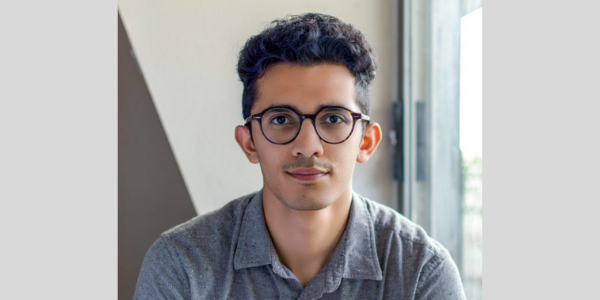About the Program
Studying Islam within the Interreligious Engagement field at Union prepares students to contribute to crucial conversations with Muslim communities and interreligious contexts. What are some of the recurring themes and central interpretative debates in Islamic tradition, texts, and practices? How do we engage Islamic tradition and practice in committed and critical ways? How do we draw upon tradition to respond to pressing questions, including dehumanization, exclusion, white supremacy, and economic injustice? How do we combat Islamophobia and anti-Muslim sentiment, while also cultivating sustaining and inclusive Muslim communities? How do we engage diversity with the goal of fostering justice and limiting harm?
At Union, IIE students engage these and other questions, while preparing for diverse leadership, academic, and professional roles. IIE students gain competency in Islamic tradition and practice, in interreligious engagement, and in questions of social disparity.
Degree Options
Master of Divinity in Islam and Interreligious Engagement (M.Div. IIE)
The M.Div. IIE is a 78 credit, three-year professional graduate degree that prepares students for leadership roles working with and in Muslim communities in interreligious contexts. This degree prepares future leaders to respond ethically to pressing contemporary questions while drawing upon Islamic traditions and practices.
Graduates of the program work in religious and spiritual leadership; chaplaincy at universities, hospitals, or prisons; professional counseling; teaching; and other careers in interreligious cooperation, policy-making, social justice advocacy, journalism, nonprofits, and government.
The M.Div. IIE curriculum engages students in sustained and probing study of Qur’an and sacred texts, history, Islamic religious sciences and theology, ibadat and practical theology, and field education. The curriculum has three distinctive features:
Focus on Islamic Tradition and Practice: The M.Div. IIE provides a solid foundation in the Islamic tradition, texts, and practices. M.Div. IIE students take at least 27 credits (9 courses) that focus on foundational sources, disciplines, practices, diversity, and contextual realities of the Islamic tradition and Muslim practice.
Focus on Interreligious Engagement: The degree involves sustained exposure to other religious traditions and interreligious engagement. Students are required to take at least 16 credits (5 courses) on Christianity, another religious tradition, and the theory, methods, and approaches of interreligious engagement.
Focus on Social Disparities: In keeping with Union’s broader curricula, the M.Div. IIE centers social disparities based on gender, race, class, sexuality, ability, religion, and other marginalizing forces. Integrated into many courses, the goal is to cultivate an ability to respond to these disparities with analytic rigor, historical consciousness, sensitivity to tradition, and compassion.
M.Div. IIE students can take courses at Union and at other neighboring institutions with existing cross-registration agreements, including the Graduate School of Columbia University (including the Middle East Institute), the Jewish Theological Seminary, and Fordham University. In addition, students can enhance their experience through thesis projects, guided reading courses, internships, and field and CPE placements at relevant sites.
- View the Degree Planner for a detailed overview of the course requirements.
Master of Arts in Religion in Islam and Interreligious Engagement (M.A.R. IIE)
The Master of Arts in Religion (MAR) is a two-year, full-time degree program with a 51-credit minimum requirement. A concentration in Islam and Interreligious Engagement (IIE) allows students to deepen their knowledge of Islamic tradition and practice, while acquiring broad knowledge in the theological disciplines of Qur’an and sacred texts, history, theological studies, practical theology, and interreligious engagement.
The MAR IIE prepares students for further academic study, teaching, and other careers in interreligious cooperation, policy making, social justice advocacy, journalism, nonprofits, and government.
MAR IIE students take at least 24 credits (8 courses) that focus on foundational sources, disciplines, practices, diversity, and contextual realities of the Islamic tradition and Muslim practice. The degree involves sustained exposure to other religious traditions and interreligious engagement approaches. In keeping with Union’s broader curricula, the M.Div. IIE centers social disparities based on gender, race, class, sexuality, ability, religion, and other marginalizing forces.
MAR IIE can take courses at Union and at other neighboring institutions with existing cross-registration agreements, including the Graduate School of Columbia University (including the Middle East Institute), the Jewish Theological Seminary, and Fordham University.
- View the MAR IIE degree planner for a detailed overview of the course requirements.
Public Programming and News

A More Plural Union
Union proudly boasts two newly-minted programs, attracting students of diverse backgrounds, offering unprecedented depth in different traditions, and doing all of this with an eye towards what it means to deal with the disparities we encounter in the world around us.
Read the Article
Associate Professor of Islam & Interreligious Engagement
Union Theological Seminary is pleased to announce that Jerusha Tanner Rhodes, Ph.D. has been promoted to Associate Professor of Islam and Interreligious Engagement without term (with tenure), by the Union Board of Trustees following the enthusiastic recommendation by the faculty’s Committee on Appointments.
Read the Article
Discovering Islam’s Beauty at Seminary
When I discovered that Union offered an Islamic Studies program that merged a deep theological engagement with a commitment to social justice, I knew I had found a home for the spiritual and intellectual yearnings.
Read the ArticleMuslims, #BlackLivesMatter, & Race in America
Su’ad Abdul Khabeer is a scholar-artist-activist who uses anthropology and performance to explore the intersections of race and popular culture.
Cultivating Ethical Responses to Hate & Islamaphobia
Dr. Simran Jeet Singh discusses how the Sikh community stands in solidarity with Muslims, and what an ethical response to Islamophobia looks like.
